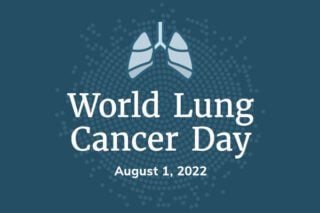
August 1st is the annual observance of World Lung Cancer Day (WLCD). The purpose of WLCD is to raise awareness about lung cancer and encourage the use of early lung cancer screenings. Various gatherings and events honor those affected by this illness, too.
Raising awareness is important because lung cancer is the leading cause of cancer deaths in the United States. In 2020, there were 2.21 million new cases of lung cancer reported. Evidence links lung cancer to various causes including smoking and asbestos exposure. Increased awareness may help research and treatment advances continue.
The History of Lung Cancer
Lung cancer affects millions of people each year. The diagnosis rate has rapidly grown over the last 100 years. Studies show that before the 1900s, less than 2% of the population had lung cancer. Throughout the 1900s, there was a rapid increase in lung cancer cases. By the end of the 1900s, it was the top cause of male cancer-related deaths in more than 25 countries.
Studies in the 1940s and 1950s showed that smoking was a direct cause of lung cancer. In the following decades, many people quit smoking because of its negative health impacts. This resulted in a global decline of new lung cancer cases. Still, lung cancer remains a major health concern.
The Importance of Lung Cancer Screenings
Lung cancer screenings are one main defense against this disease. These screenings are important for anyone at risk of developing lung cancer. This includes those with asbestosis or a history of smoking.
Screenings are also important for anyone experiencing symptoms of lung cancer. Among others, these symptoms may include chest pain, coughing and difficulty breathing. Patients should discuss any lung cancer symptoms with their doctors.
Lung cancer continues to affect millions of people each year. This is because of causes like ongoing tobacco smoking habits and secondhand smoke. Exposure to airborne carcinogens, such as asbestos, may also lead to lung cancer.
Asbestos, Lung Cancer and Mesothelioma
Asbestos exposure may cause both lung cancer and mesothelioma. Asbestos is a mineral that was once used in thousands of products. Since the 1980s, the United States has regulated its use.
Asbestos may still be present in many older buildings, materials and products. If individuals inhale asbestos, the fibers can embed themselves in the lung lining. This may later lead to asbestos cancers like lung cancer or mesothelioma.
Lung cancer only develops in the lungs. Mesothelioma can develop in various areas of the body. For example, it could develop in the lungs (pleural mesothelioma) or abdomen (peritoneal mesothelioma). Both cancers may metastasize, or spread, to organs in other areas of the body.
How to Observe World Lung Cancer Day
People have different reasons to support WLCD, and there are many ways they might choose to observe this day. Some ways to observe WLCD include:
- Adopting healthy habits like quitting smoking
- Contacting elected officials in Congress and urging them to support more research
- Donating to lung cancer organizations, like American Lung Association
- Finding local or virtual gatherings to celebrate survivorship
- Joining advocacy and support groups like LUNG FORCE
- Learning more about lung cancer screenings
- Reviewing the risk factors for lung cancer
- Sharing information to raise awareness about lung cancer
Individuals can get involved in WLCD in several different ways. Getting involved helps raise awareness about lung cancer and early screening. Research and advocacy offer support for those affected by this disease.
Visit the events page for details about WLCD and other cancer-related observances.




